
62 posts
Latest Posts by atomiccgoth - Page 2
concept: a room with no communication to the outside world. no one looks for you. you spend the days thinking of things to do, and dabbling in those things, and passing the time in the calm that is finally being free of social obligation.
There was a question my therapist asked me a few years ago that I still think about to this day. And now, I shall pose the question to you:
"Are you healed or just distracted?"
This has definitely been said before I feel it in my left kidney but
The reason we can't distinct what's symptoms of autism/or quite frankly any neurodiversity and what's effects of trauma is because society has not produced a single not-traumatized neurodivergent person.
So what I learned about myself by researching these topics about abuse, collected from experts and therapists who work with complex trauma patients:
Betrayal Trauma is the name of what I went through in my household
Scapegoats are often betrayed by parents and I fit the scapegoat role
Scapegoats are often “truth tellers” and fight the family narrative
Scapegoats can be betrayed by one family member OR they can be betrayed by the whole family in which the family narrative is “we are all okay and right, and you (the scapegoat) is the crazy/wrong one.”
Scapegoats often have DARVO used against them (when the abusers in the family call the scapegoat the abuser, and the real abusers/parents call themselves the victims)
Scapegoat may feel betrayed, rejected, shamed, become a people pleaser, overly forgiving, may avoid relationships and end up isolating yourself from others
Some become dependent on the abusive family as an adult, slow to get ahead in life
Toxic shame is not just feeling ashamed, but YOU ARE shame (not really true, your brain lies to you). You think You Are Shame walking around on 2 legs. (How I feel and doing my research I understand it’s the trauma brain talking but I genuinely believe the lies). “I feel humiliated when I speak in front of others” “I feel humiliated for existing and taking space”
You could have had a fight response, challenge the abusers distorted, twisted view of reality. It causes exhaustion from challenging the family false narrative growing up. You may identify with being the “fighter.”
Family Systems expert Rebecca C. Mandeville explains adult survivors of Family Scapegoating Abuse (FSA) are impacted by Betrayal Trauma. She also explains the consequences of being rejected, shamed, and blamed by the people who were supposed to love and care for you the most.
Dr. Erin Watson’s article: The Duel Layers of Betrayal Trauma for Survivors of Family Scapegoating Abuse.
I have a river in my system too! 😗
i want to orginize something on one of our profiles bc thats my job but theres nothing to organize anymore i did it all already -river
plural culture is forgetting why you were upset cuz you switched
.
YOOO just finished dishes let’s GOOOOO
Shout out to alters that do chores/household tasks for the body. You are heros ♡
Resources
Hello lovely followers! This page is a collection of resources to help you with your questions. These are all resources that are frequently referenced on this blog. They are broken down into categories based on the subject matter. As always, if you have any questions, send us an ask!
General Autism Resources
What is Autism?
Another What is Autism?
What is Autism? (ASAN)
What is Autism? In Plain Language
Dictionary of Autism-related Concepts
Inclusive Autistic Traits
Myths About Autism
Autism FAQ
ASAN’s About Autism
Ask an Autistic (videos about autism by an autistic)
Don’t Mourn For Us
Autism Resources
Autism Masterpost
Autism 101
Self-Diagnosis Resources
DSM-V Criteria
ICD-10 Criteria
A Self-Diagnosis Masterpost
Autism Self-Diagnosis Masterpost
A Diagnosis Checklist Masterpost (contains checklists for many neurodivergencies not just autism)
Autism Does Not Reside in a Medical Report
My Stance On Self-Diagnosis
Positively Autistic: A List of (Positive) Autistic Traits
Adult Diagnosis
DSM Criteria for Autism Explained
Simplified Diagnostic Criteria
Autism Quizzes
Adult Diagnosis Series
ASD Paper Diagnosis vs. Self-Diagnosis
I Think I’m Autistic
Autism versus…
Autism vs. PTSD
Autism vs. BPD
Autism vs. ASPD
Autism vs. StPD
Autism vs. SzPD (follow-up)
Autism vs. Schizophrenia
Autism vs. Psychosis
Autism vs Social Anxiety
Shutdown/Meltdown vs. Sensory Overload vs. Panic Attack
Autism and ADHD
What is the differences between autism and ADD/ADHD?
Autism With a Side of ADHD
Differences between autism and ADHD
ADHD Self Diagnosis
Sensory Processing Topics
What Is Sensory Processing Disorder? (video)
SPD Checklist
SPD Resource Center
Understanding Sensory Processing Issues
Masterpost Sensory Differences
Sensory Sensitivities and Atypical Sensory Processing
How to Reduce Sensory Overload
Processing a Sensory Overload
Autism A-Z: I is for Interoception
Sensory Processing Disorder Resource List
Meltdowns and Shutdowns
What Does a Meltdown Feel Like?
“Shutdown” What It Is and What It Isn’t
Where I Go When I Shutdown
Anatomy of a Meltdown
Shutdown: A Specific Type of Meltdown
Autism A-Z: M is for Meltdowns
Autistic Burnout
Autistic Regression and Fluid Adaptation
“Help! I Seem to Be Getting More Autistic!”
Autistic Burnout
What is Autistic Burnout?
Autism A-Z: B is for Burnout
What is Autistic Burnout? Infograph
Echolalia
The Naked Mechanisms of Echolalia
Echolalia: That’s What She Said
Alexithymia
What is Alexithymia? (video)
Alexithymia Question
Emotional Dysfunction: Alexithymia and ASD
What Alexithymia Feels Like for This Autistic
Hyper-Empathy
Hyper-Empathy In Autistic Individuals
On Emotions, Hyperempathy, and Hypersensitivity
Hyperempathy Feels FAQ
The Intense World Syndrome- An Alternative Hypothesis for Autism
Executive Dysfunction
Executive Dysfunction
Executive Function Series
The “Joys” of Executive Dysfunction
So What Is Executive Dysfunction?
How to Live Better With Executive Dysfunction
Special Interests
What’s So Special About a Special Interest?
Special Interests
How Do I Know for Sure What My Special Interests Are?
Autism A-Z: S is for Special Interests
Stimming
Stimming 101, or: How I Learned to Stop Worrying and Love the Stim
What Is Stimming?
Types of Stimming
What is Stimming?
The Stimming Checklist
The High Cost of Self-Censoring (Or Why Stimming Is a Good Thing)
Where to Buy Stim Toys
Stimtastic
A Sense of Self
Fuzzwumpet
Weird Faeles
SpacerobotStudio
Ruthdoodle
Autistic Rabbit (weighted blankets)
Fidgetopia
The Fidget Shop
Fat Brain Toys
Neurodivergent Creators
The following are people from our community who create products that are helpful for autistic people such as stim toys, communication tools, and more! Check out their shops as a way to support neurodivergent creators!
PangeaMea by Francis Mark (autism, OCD, ADHD, anxiety, depression) sells stim toys, sensory friendly clothing, noise muffling beanies and headbands, padded arm protectors, and skin picking simulators.
StimForTheWin by Exo (autism and ADHD) sells tangles and fidget cubes with silicone spikes on them for maximum stimming, communication necklaces (also with silicone spikes), and marble mazes/ donuts.
StrangerDarkerBetter by Mod Sabrina (autism, ADHD, schizoaffective, PTSD, depression, anxiety) sells visual schedules and communication cards.
PieFanArt by Pie (autistic) sells mostly plush toys, art and jewelry but also weighted plushies and scented plushies!
WagglesStudio by Dailyspeal sells stim toys
Identity First Language
Identity First Language
I Am Disabled: On Identity-First Versus People-First Language
I is For Identity First Language
Why I Dislike “Person First” Language
Autism A-Z: P is for Person First
Autistic In the Workplace
Autistic in the Workplace Inforgraph
Autistic in the Workplace: Autism and Interviews
Autistic in the Workplace: Change
Autistic in the Workplace: Professional Dress
Autistic in the Workplace: Hallway Conversations
Neurodiversity and Autism Acceptance
Why Acceptance
Neurodiversity: Some Basic Terms and Definitions
Autistic Pride and What You Need to Know
Autistic Community
Welcome to the Autistic Community
Autistic Culture
A Love Letter to the Autistic Community
Defending and (Re)defining Self-Advocacy
The Social Model of Disability
Disabled Not Disordered: Autism and the Social Model
Social Model of Disability Animation (video)
Understanding Disability Models
A Social Model of Disability Analogy
What’s Wrong With Functioning Labels?
Functioning Labels Masterpost
Functioning Labels 101
Decoding the High Functioning Label
Functioning Labels Comic
On Functioning and “Functioning”
F*%$ Your Functioning Labels
More Problems With Functioning Labels
Fluctuating Functionality
Asperger’s and Autism
Why Autism $peaks is Bad
What’s Wrong With Autism Speaks
Why I am Against Autism Speaks (and you should be, too)
Updated Autism Speaks Masterpost
Boycott Autism Speaks
I Resign My Roles With Autism Speaks
A Few Selected Autism Speaks Quotes
How the “Autism Speaks” Charity Failed the Community It Set Out to Serve
What’s Wrong With ABA?
ABA Masterpost
Why I Oppose ABA as a Method of Instruction
ABA 101
Trauma and Autism
What ABA Is Like From the Point of View of a Former Therapist
Why I Left ABA
Anti-Anti-Vaccination
On Vaccines, Autism and Systemic Bigotry (masterpost)
Vaccines Don’t Cause Autism, but That’s Not the Point
Vaccines Don’t Cause Autism, but So What if They Did?
Everything Wrong With Vaxxed (video)


i dont like to talk about self-diagnosis because i dont enjoy people making assumptions about me, my illnesses, and my diagnostic status. but i will say:
i have self diagnosed and gone on to be medically validated with an official diagnosis. multiple times actually. i was never wrong about my self-diagnoses.
however, i have been misdiagnosed by professionals FIVE TIMES. and let me tell you, a professional diagnosis being wrong is far more harmful than a self-diagnosis being wrong.
if your self diagnosis is wrong, maybe you used the wrong language or put yourself in a box or now feel invalid and whatnot. but if your professional diagnosis is wrong, it can lead to abuse, medical trauma, panic attacks, issues with medication, even suicide.
i was misdiagnosed with BPD when i was 15 by a psychologist that i spoke to for hardly even 10 minutes. this diagnosis was based on my parent's description of my reactions to abuse, and the diagnosis was used to validate and excuse their abuse.
i was misdiagnosed with MDD when i was 12 and put through several different types of anti-depressants. we never found anything that worked, because it was actually ADHD and dissociation, but i did end up with panic attacks and insomnia all throughout middle/highschool!
when i self-diagnosed with autism however, it saved my life. it took me out of active suicidality because i was able to finally able to accept myself after years of feeling like i am just "being a person wrong". i had the knowledge to accomodate for myself and the language to advocate for myself. this was life changing. even if i was wrong, which i wasnt, i dont see how it couldve caused any harm.
my opinions on self-diagnoses arent black and white, and im not entirely settled on them either, but i do think this is important to understand. doctors and psychologists are not all knowing. we live in a time where we can access thousands of dollars worth of university level education on the internet, even the same exact resources medical students use. plenty of people are capable of interpreting themselves and that information to come to a conclusion about what they are experiencing and what might help.
sure, self-diagnosis might be biased. but a professional is most likely going to be just as biased, and possibly less aware of it. its just silly to use bias as a primary argument when it is an inescapable feature of human psychology. there is a reason ADHD is underdiagnosed in women. there is a reason anxiety disorders are underdiagnosed in men.
an incorrect self-diagnosis wont take away resources or your space in your comminities. but professional misdiagnosis can cause real damage.
(i am not trying to fear-monger about professional diagnosis, moreso responding to the fear-mongering surrounding self-diagnosis)
i have done so much research and i have a theory that women with autism/adhd/bipolar + trauma = a bpd diagnosis
Nd culture is having to say "Sorry but I don't have the energy to care today" when friends bring up heavy topics cuz you used all your spoons on other activities.
.

One of the reasons I believed I couldn’t be autistic for so long was due to a fundamental misunderstanding of my social struggles. This being that I am not by any means incapable of memorizing social rules. Through observation and direction I can construct a broad framework of ‘socially acceptable or not.’ For example, I’m well aware that making physical contact with someone without consent isn’t acceptable. Or that stating blunt facts in a way that implicates someone negatively isn’t allowed. I know to avoid interrupting others if they’re already talking, to not walk away when I’m in the middle of a conversation. Crying, being unusually quiet and frowning indicates sadness. Someone smiling at laughing at what you’re saying means they probably are enjoying their time with you. An increase in speaking volume indicates excitement- either positive or negative. Sarcasm is often indicated by someone saying something absurd that you know they would never say, or you know to be factually wrong.
The fact that I had learned these broad rules made me think autism wasn’t a possibility for me. But being autistic doesn’t stop you from obtaining and applying information. (I mean that’s why so many interventions that ‘treat’ autism do result in the autistic person being able to pass as neurotypical.)
The difference comes from lacking the subconscious nuances and exceptions that come with those broader rules. For example- when is it okay to actually be honest? Some people will not be bothered by physical intimacy- but how would I know this? How can you tell if a group wants you to join in with their conversation? How to tell if this person is smiling and laughing politely or genuinely? How to tell if someone who you know very little about is being sarcastic?
There are not direct, easy to apply ‘rules’ for this, and yet clearly there are ‘right’ options. When the appropriate reaction must be determined by subtle body language or small shifts in tone of voice, ones that are near impossible to teach- I become completely lost.
That’s something I always find lacking with the general social skills advice given. It’s helpful to a point, but the truth is everyone is an individual. People express themselves differently, and react to your same actions differently due to past circumstances or temperaments. There is no one set of rules you can use for everyone, unfortunately. The majority of neurotypicals, while of course having miscommunications and the like, can rely on their subconscious to parse out any subtle changes they might need to make to their demeanor for a particular situation. My brain is much less adept at focusing down broader experience/rules into unique circumstances. (This is actually something that extends past social cues for me and I might make another post talking about it because I think it’s interesting)
Anyway rant over but yeah this was a huge mental barrier to seeking out a diagnosis for a while because at some level I ( ironically enough) took struggling to understand social cues too literally…
ppl will say “i hate being seen with you in public because you stand funny and wear your headphones all the time and talk too loud” and then get all defensive when you say thats ableist
I’m genuinely sobbing this is awful and amazing at the same time
Traits of Autism in girls
As observed by Tania Marshall. My older daughter and I fit this well, though it fits her a bit better because I really matched a lot of the original Autism profile based more on how it presents in boys.
A surprising number of people are pissed off by the very fact that anyone makes a distinction between the presentation of Autism in females versus males. But it’s frequently overlooked in girls simply by virtue of how girls are raised or treated in society, or simply due to the fact that they’re girls and are frequently (though not always) hardwired differently (as opposed to my case where I fit a large amount of the original profile).
This is a long list but the gist of it is that girls tend to appear more social due to mirroring others or being encouraged to be more social. Inability to do so is often dismissed as shyness. Diagnosticians I’ve met have used that alone to dismiss a diagnosis of Autism, and I have to assume this is a frequent practice.
Keep reading

What if I just started going by a different name and pronouns and had different likes and ideas and memories and opinions and presented differently and acted differently... but like I'm still me though... no I'm not a system at all...
shoutout to my therapist who, upon me telling her i didn’t like the word alter, started referring to my headmates as “my homies.” like “any updates on your homies? have you heard from your homies at all this week” she’s the only true plural ally
Absolutely relate
January depression just snuck up on me 😩 and in a few days I cleaned my home, body, and soul. I shed my skin of last year and am rejuvenated and ready to conquer my next step of growth.
I go to seek a great perhaps.
~ Francois Rabelais
Autism Diagnosis Criteria Explained
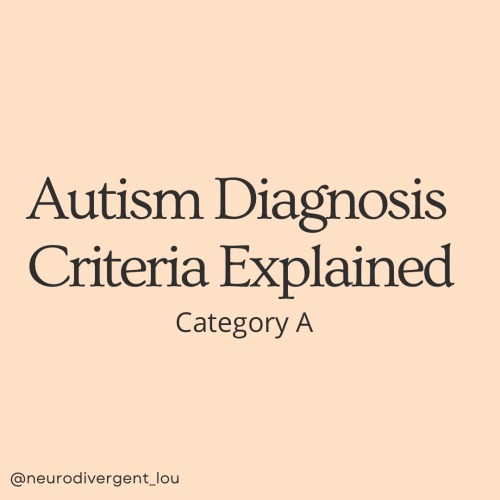
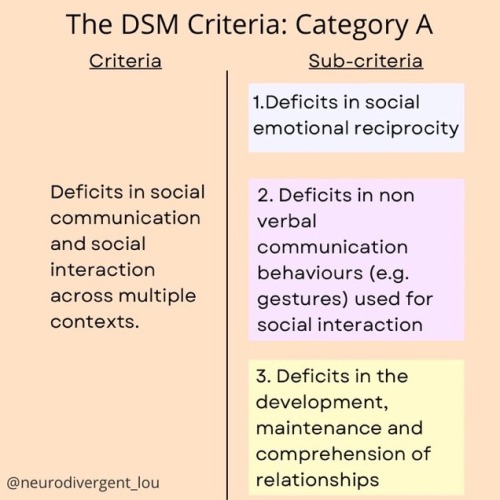
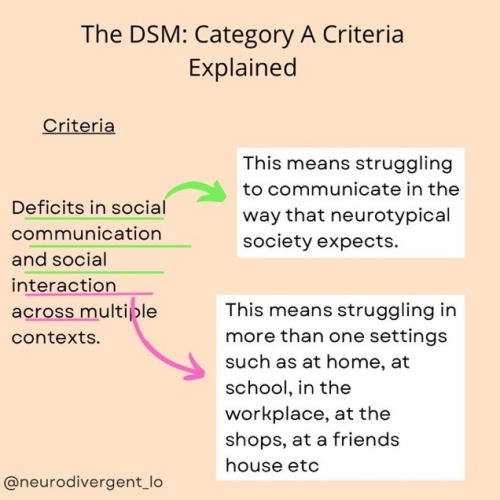
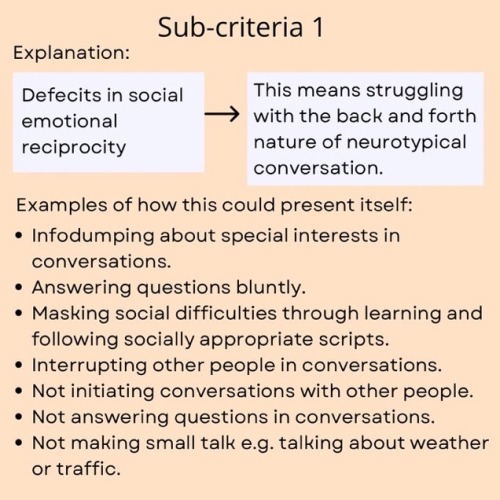
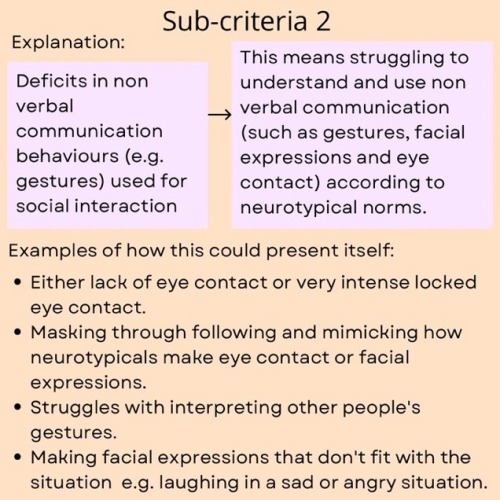
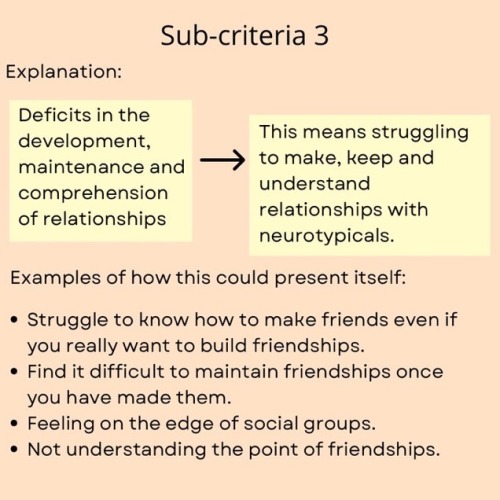
@neuro_lou
As a late diagnosed autist I will say one of the most damaging but transformative experiences I've ever had was being misdiagnosed with BPD.
Everyday my heart goes out to people with BPD.
The amount of stigma and silencing they face is astonishing and sickening.
I took DBT for years. Therapists use to turn me away because of my diagnosis.
I would be having full blown autistic meltdowns, crying for help literally - but because I was labeled as BPD ANY time I cried I was treated as manipulative and unstable.
As if the only reason I could be crying was if I was out to trick someone.
95% of the books out there with Borderline in the title are named shit like 'How to get away from a person with Borderline', 'How to stop walking on eggshells (with a person who has BPD)'
I was never allowed to feel true pain or panic or need.
That was 'attention seeking behavior', not me asking for help when a disability was literally inhibiting my ability to process emotions.
There were dozens of times where I had a full meltdown and was either threatened with institutionalization or told I was doing it for attention.
My failing relationships weren't due to a communication issue, or the inability to read social cues. No, because I was labeled borderline, my unstable relationships were my fault. Me beggong nuerotypicals to just be honest and blunt with what they meant was me pestering them for validation.
Borderline patients can't win.
And the funny thing is - I asked my therapist about autism. I told her I thought I was on the spectrum.
BPD is WILDLY misdiagnosed with those with autism and I had many clear signs.
Instead - she told me 'If you were autistic we wouldn't be able to have this conversation'. She made me go through a list of autistic traits made clearly for children, citing how I didn't fit each one.
And then she told me that me identifying with the autism community was the BPD making me search for identity to be accepted - and that I wasn't autistic, just desperate to fit in somewhere.
I didn't get diagnosed for another ten years. For ten years I avoided the autism community - feeling as if I were just a broken person who wanted to steal from people who 'really needed it'.
Because of my providers - I began to doubt my identity MORE, not less.
Ten years of thinking I was borderline and being emotionally neglected and demonized by a system meant to help me.
To this day, I still don't trust neurotypicals. Not fully.
I know I'm not borderline now - but my heart aches for them. Not for the usual stuff. But for the stigma. And the asshole doctors. And the dismissiveness and threatening and the idea of institutionalization hanging over their head.
I love Borderline people. I always will. I'm not Borderline but if you are I love you and I'm sorry.
You're not a bad person. You're not a therapists worst nightmare, you are a human with valid feelings and fears.
Borderline people I'm sorry.
BPD culture is crying your eyes out at 1am because you can't understand why it feels like everyone around you hates you or why you feel like a terrible person even though everyone around you says you aren't.
.
Leaf
I will recognize you in total darkness, were you mute and deaf. I will recognize you in another lifetime entirely, in different bodies, different times and I will love you in all of this, until the very last star in the sky burnt out into oblivion.
— Achilles
Leaf
it has never been about who stays. it has always been about who shows up. and the difference between these two things is everything.
Leaf

Mia Hollow
A quick guide to animal symbolism:
Animals have a long history of symbolism that varies between cultures and customs. As literary tropes develop, some animal symbolism has become universally recognised in the western literary canon. Here are some examples you can use in your writing to give subtext, develop motifs, or promote your thematic content.
🐥 Birds: freedom, hope, escape 🦁 Lions: strength, courage, royalty 🐶 Dogs: loyalty, devotion, protection 🐱 Cats: independence, stealth, mystery 🐺 Wolves: intelligence, nature, wildness 🦊 Foxes: cleverness, cunning, deception 🐍 Snakes: temptation, evil, deceit 🦋 Butterflies: transformation, change, new beginnings 🦉 Owls: wisdom, knowledge, mystery 🦅 Eagles: strength, freedom, nobility ◾ Ravens: death, mystery, the unknown 🕊️ Doves: peace, love, purity 🐻 Bears: resurrection, strength, power, new life 🤘 Bulls: virility, sovereignty, wealth

- All That Consumes Us
Leaf
You are the promise I want to keep
Until my grave weeps.
You are the language I want to learn
Until our souls become one.
You are the melody I want to dance to
Till my legs turn blue.
For, you are my dose of insanity
Leading me away from sensibility,
For, you consume my entire being,
until I dream only of you again.
For, I am the river flowing with no aim
Tirelessly waiting for you to claim
Whole of me, now in vain.
For, you are in the canvas I paint,
In the poems I write
And The music I play.
Oh how you dominate my thoughts,
So much so that without you I am a body with no soul,
An ocean whose water overflows
And a star, bright no more.
For, you are the ocean I want to submerge myself in
The dream I want to conquer,
The air I want to breathe,
And the arms I want to call home.